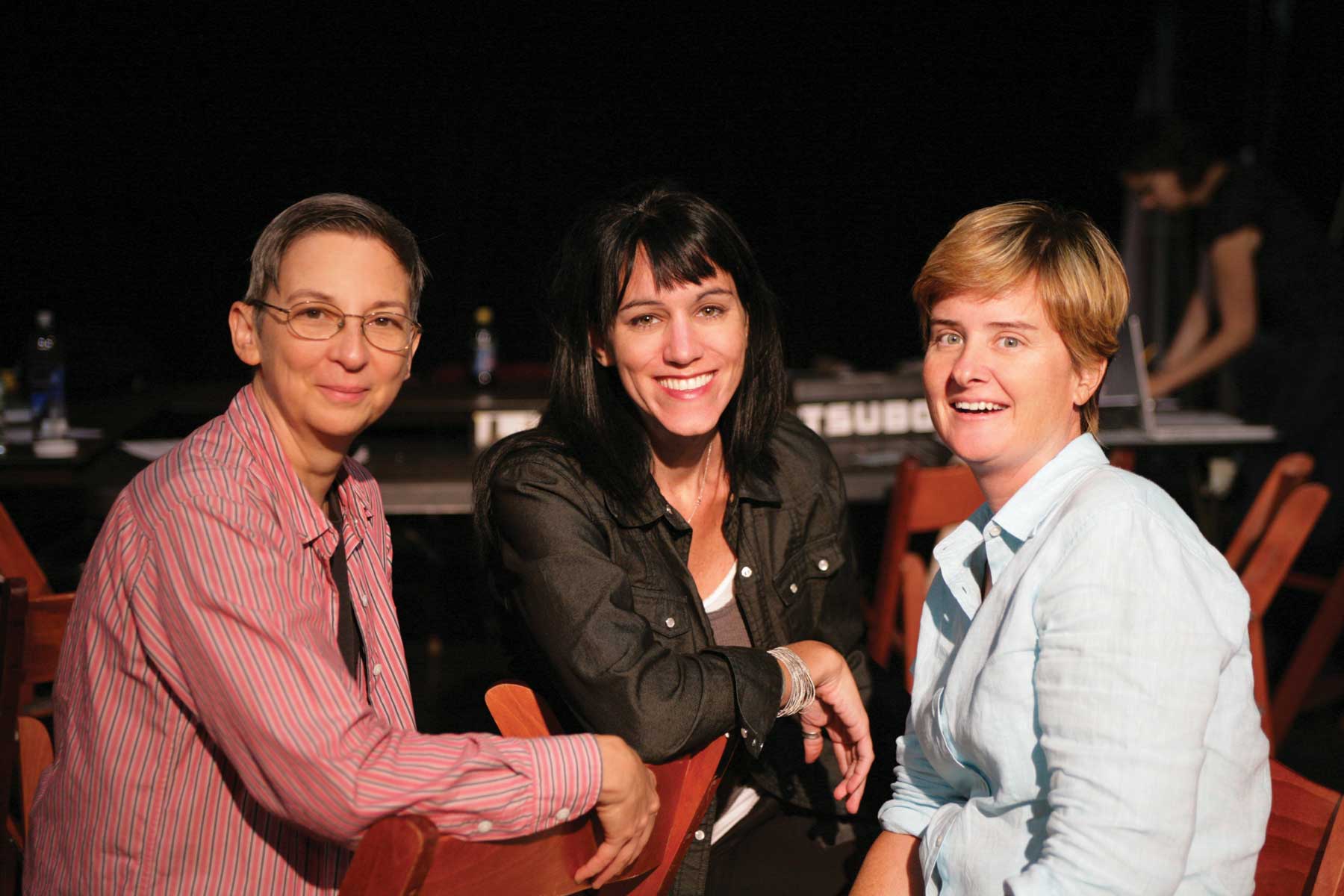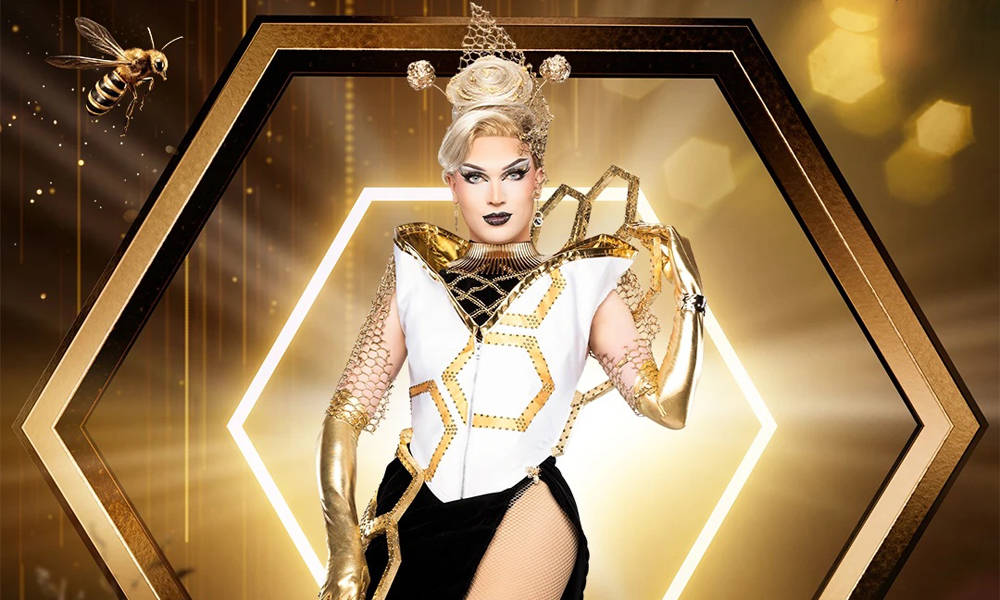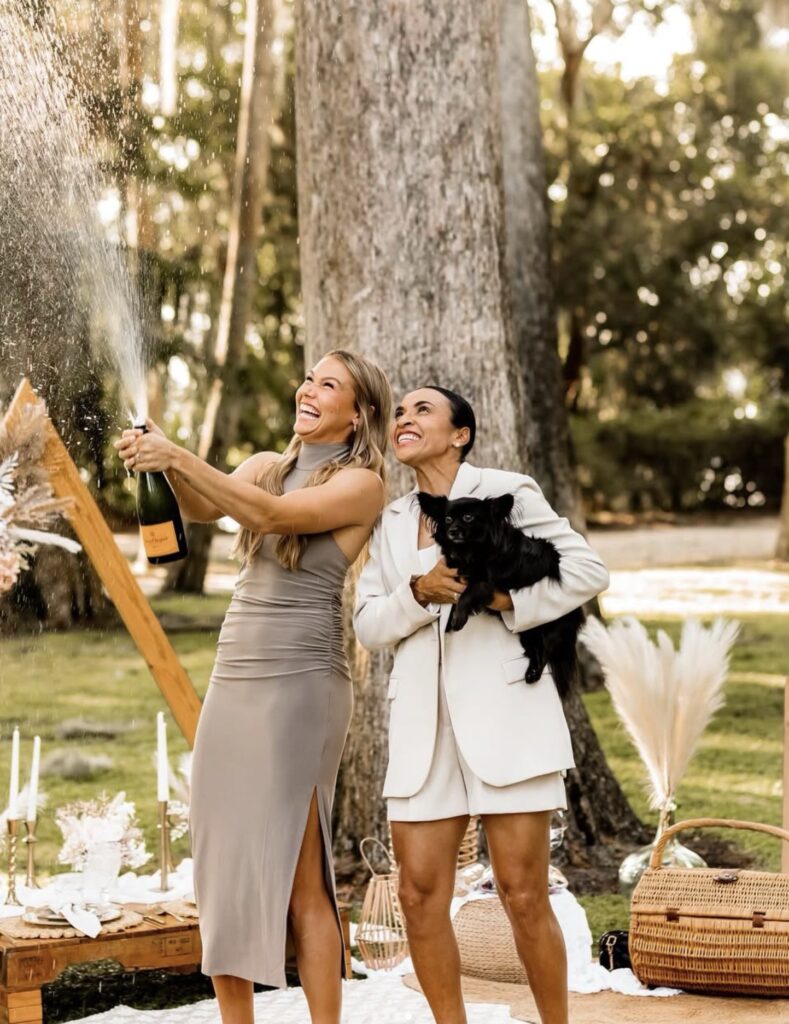Beebo Reborn

An Off-Broadway play breathes new life into Ann Bannon’s beloved lesbian pulp series.
“That’s all the village is, honey: just one crazy little soap opera after another. All tangled up with each other, one piled on top of the next, ad infinitum. Mary loves Jean, Jane loves Joan, Joan loves Jean and Beebo loves Laura. Doesn’t mean a thing,” Beebo (Jenn Colella) snaps, shrugging her shoulder and glancing back at Laura. As the central character in The Beebo Brinker Chronicles, Colella’s Beebo moves with the kind of swagger that is no longer fashionable, but still feels awesomely familiar.
“To me that’s the interesting style of the show,” director Leigh Silverman told GO about the production, which is currently at 37 Arts. According to Silverman, “The books were written completely in earnest. So how could we make fun of them, how could we turn them into some ridiculous romp? It was really our desire to honor the tone and, along with that, the ridiculousness, the sex and the humor.”
The show, written by Kate Moira Ryan (25 Questions for a Jewish Mother) and Linda S. Chapman (Gertrude and Alice: A Likeness to Loving), is based on Ann Bannon’s pulp novels, six of which are collectively titled The Beebo Brinker Chronicles, and which have become recognized guidebooks to lesbian culture. But even in 1957, Bannon’s first book in the series, Odd Girl Out, was the second-best-selling paperback of the year. One can just imagine women grabbing them off the shelf, stealthily fulfilling their own sexual fantasies through the furtive lives of Bannon’s characters. “The Queen of Shame,” as she’s been called, became a popular sensation, and in 1983, Naiad Press reprinted five of the novels. Cleis Press followed suit in 2001.
So it was quite a task for Ryan and Chapman, culling material from three novels to create only 90 minutes of dyke drama. While the novels were revolutionary then, they still hold significant insights into lesbian identity, not the least of which involve intimate, intensely sexual feelings. But the artistic goal of this production is to mine the stories for their universal themes of “finding your way, and growing up and making a lot of mistakes and being given a second chance,” as Silverman puts it.
As one of the youngest women directors to work on Broadway (Lisa Kron’s Well), Silverman sought to create a style here that walks the line between camp and genuine, meaning real. “Even though the characters are comedic and broad, they have a serious undertone,” she explains. “So when people laugh, they’re really laughing because they recognize the situation or they understand it.”
Silverman has many irons in the fire. Her show Hunting and Gathering is currently running at Primary Stages and her production of David Henry Hwang’s Yellow Face at the Public Theater, which addresses racial issues in casting, was extended due to popular demand. When asked if sexual orientation was a factor in her casting of Beebo, the director replied, “Not at all…I have to tell you it’s the most game group of women. ‘Oh good, can we practice the kissing today?’ It’s just lots and lots of fun.” According to Silverman the cast is a mix. Whether gay or straight, “they are wildly into making out with each other. They do a lot of flashing all day long during rehearsals.”
There were hurdles, she confides. One huge challenge was finding the right set. According to Silverman, the original one was tossed after the first few rehearsals. Then Rachel Hauck designed a nearly empty set with a few bar stools at one side and some stairs coming down off a large platform, like a stage within the stage. Within this space, the action moves fluidly from a gay bar in Greenwich Village to Beth’s marital bedroom, to Laura’s bedroom, to Beebo’s bedroom, and to the bar where Beebo works as a bouncer (which doubles as yet another bedroom). That bar is where she meets Laura (the Obie Award-winning Marin Ireland), who’s still hysterical from the loss of Beth (Autumn Dornfeld), who dumped her in order to get married. There’s also a gay man (played by the inimitable David Greenspan) who’s full of corny advice, such as: “It’s no good falling for the straight girls, Laura.”
But Laura does fall for them, especially the ones with tight red sweaters and curve-hugging skirts. In fact, the costumes are among the most captivating elements in the production. The ‘50s attire could have been taken directly from Bannon’s book covers.
While this dyke drama is a world apart from the drag humor of Charles Busch or Lypskina (John Epperson), it plays on similar imagery—the pre-women’s lib, pre-Stonewall, pre-gay rights era. These conventions come alive in the play’s lesbian characters—be it Laura, the hysterical femme, or Beth, who finally surrenders to her lesbianism, abandoning her children for the gin-soaked haunts of Greenwich Village. Moreover, Beebo herself is an alcoholic who beats her girlfriends.
As Kate Moira Ryan says of Beth, “I think any character who is trying to find herself in such an extreme way is not going to be sympathetic. But in the end I think there is an empathy that you feel for her, because she does give up so much to find some kind of peace.”
Ryan, Chapman and Silverman have inserted their own contemporary voices while remaining true to Bannon’s novel. Interestingly, the character of Beebo, who is described as husky and nearly six feet tall in the novels, is played by the pint-sized musical comedy actress Jen Colella, who starred in the Broadway productions of Urban Cowboy and High Fidelity. Despite her diminutive size, Colella conveys a “tough” butch, playing the role with a Runyonesque edge.
While Colella did not originally portray Beebo when the show was first produced at the 4th Street Theater, she certainly brings her particular brand of butchdom to the marquis at 37 Arts. In talking about the move to a bigger venue, Silverman explains that the show downtown was almost completely sold out before it even opened. “Now we have a lot of hope that this play, which I think is a really unusual little gem, can find its way into the heart of more people.”
Given that Lilly Tomlin and Jane Wagner have just signed on as producing partners, that might just happen. So, if you haven’t seen it, “reach out and bug someone,” as Ernestine (Tomlin’s wisecracking telephone operator) would advise, to escort you there. n














